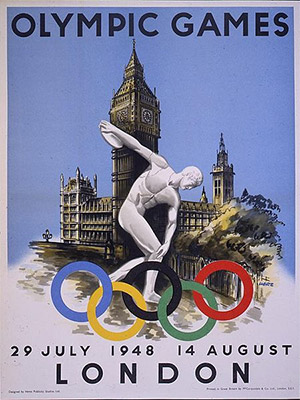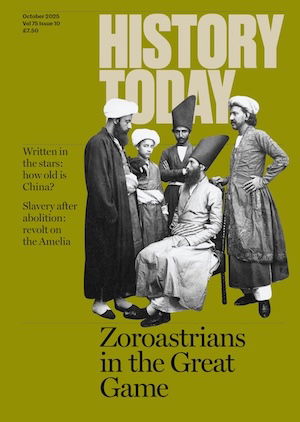Opening of the London Olympics
Richard Cavendish remembers the opening of the ‘Austerity Olympics’ on 29 July 1948.
 The sun blazed down on Wembley Stadium in London on Thursday, July 29th, 1948, when the fourteenth games of the modern Olympiad were formally opened by George VI in the presence of a host of dignitaries and a crowd of more than 80,000 people. The King, in naval uniform, was accompanied by the Queen and Princess Margaret. Lord and Lady Mountbatten were there, as were the Shah of Iran and the Secretary-General of the United Nations, Trygve Lie. The members of the International Olympic Committee paraded on the turf in top hats. The games had attracted some 6,000 competitors from countries ranging through the alphabet from Afghanistan to Yugoslavia. The Germans and the Japanese were not invited and the Soviet Union stayed away. The Olympics of 1944 would have been held in Britain, but had been cancelled because of the Second World War, and there was a certain appropriateness in the fact that the 1948 games in London were the successors to the notorious 1936 event in Berlin, which had been employed for Nazi propaganda by the German regime.
The sun blazed down on Wembley Stadium in London on Thursday, July 29th, 1948, when the fourteenth games of the modern Olympiad were formally opened by George VI in the presence of a host of dignitaries and a crowd of more than 80,000 people. The King, in naval uniform, was accompanied by the Queen and Princess Margaret. Lord and Lady Mountbatten were there, as were the Shah of Iran and the Secretary-General of the United Nations, Trygve Lie. The members of the International Olympic Committee paraded on the turf in top hats. The games had attracted some 6,000 competitors from countries ranging through the alphabet from Afghanistan to Yugoslavia. The Germans and the Japanese were not invited and the Soviet Union stayed away. The Olympics of 1944 would have been held in Britain, but had been cancelled because of the Second World War, and there was a certain appropriateness in the fact that the 1948 games in London were the successors to the notorious 1936 event in Berlin, which had been employed for Nazi propaganda by the German regime.
The competitors marched round the arena, with the smallest teams – one competitor from Malta and two from Singapore – receiving particularly warm applause before the King was formally invited to open the games by Lord Burghley, himself an Olympic gold medallist (in the 400 metres hurdles in 1928). The trumpeters of the Household Cavalry sounded a fanfare, the Olympic flag was raised, 7,000 pigeons were released to swoop and flutter around the stadium and a salute of twenty-one guns heralded the arrival in the arena of the Olympic flame. The bowl was solemnly kindled in front of a hoarding with a famous quotation from Baron de Coubertin, founder of the modern Olympics, in words which had a certain ring to them in the circumstances. ‘The important thing in the Olympic Games is not winning but taking part. The essential thing in life is not conquering but fighting well.’
Britain was still in a state of post-war bankruptcy, austerity and exhaustion. Bread rationing, as it happened, ended on the same day that the games began. There had been no question of building an Olympic village and no money to create new stadiums. Well-worn venues were used for the swimming in the Empire Pool at Wembley, the shooting at Bisley, the yachting at Cowes, the rowing at Henley. The competitors stayed at colleges and barracks in and around London. Because of rationing, many of them had to bring their own food.
The Americans dominated both the athletics and the swimming, and finished with the highest number of gold medals with thirty-eight, followed by Sweden with seventeen and France and Hungary with nine apiece. Great Britain won only three (two in rowing, one in yachting), failing to win an athletics gold medal for the first time since 1904. For the Americans, the seventeen-year-old Bob Mathias won the decathlon as the youngest-ever winner of an Olympic athletics gold medal, and the men’s 100 metres was won by Harrison Dillard, who equalled the Olympic record of 10.3 seconds. In the 400 metres Arthur Wint of Jamaica equalled the Olympic record of 46.2 seconds to win the gold medal and he came second in the 800 metres. There was an exciting finish in the marathon, when the leader, Etienne Gailly of Belgium, was overhauled on the last lap in the stadium by Delfo Cabrora of Argentina after more than two-and-a-half hours of running. The star of the men’s events, however, was the great Czech long-distance runner Emil Zatopek, ‘the human locomotive’, ungainly but compelling, who won the 10,000 metres by almost an entire lap in a new Olympic record time of 29 minutes 39.6 seconds. He also broke the Olympic record in the 5,000 metres, even though he was narrowly beaten into second place by the Belgian, Gaston Reiff.
In the women’s events the Hungarian fencer Ilona Elek pulled off a remarkable feat in successfully defending her 1936 ladies’ foils title after a gap of twelve years, but the leading woman of the games was the astonishing Dutch housewife Fanny Blankers-Koen, a mother of two who at thirty had been widely considered too old to be competing at all. She won both the 100 and 200 metres sprints and in a photo-finish the 80 metres hurdles, too, as well as helping Holland to victory in the 4x100 metres relay. No woman athlete had ever won three events before, and she had not even been entered for the long jump, although she held the world record. Her success and the attendant publicity gave women’s athletics a powerful boost.
Despite the prevailing austerity, the games were generally rated a success and ended on August 14th. Four Czechs and a number of other competitors from Eastern Europe decided not to return home.




